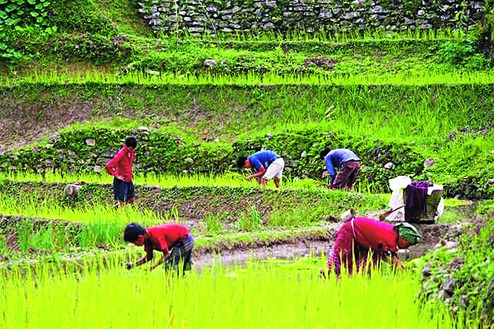
Guwahati: Tekhe Colo, a Class XI student in Nagaland's capital, Kohima, knows how to grow paddy, right from sowing seeds to making traditional water channels for irrigation and using eco-friendly compost as fertiliser.
She also knows that traditional jhum cultivation is destructive to a hilly state and the environment.
Tekhe possess the knowledge of a Naga farmer despite being the daughter of a Kohima-based businessman who lives far away from the paddy fields and farmers' community.
Tekhe owes her skills to the six-day summer farm school that she had attended last year in Chizami village, 100km from Kohima. It had been organised by North East Network, an NGO, as part of its natural resource management programme. The NGO works for women and children's rights in the region.
"I will try to convince our farmers to leave jhum cultivation and switch to sustainable livelihood options like bee keeping. I'll urge them not to use harmful chemicals and pesticides. For the time being, I want to grow some vegetables on the roof of our home with the compost that I had learnt to make at the farm school," the 16-year-old said.
Nearly 60 students from Dimapur, Kohima, Phek, Pfutsero and even Guwahati had taken part in the farm school course since its launch 20 students in 2016.
"We provide them hands-on training on customary practice of water, land and forest management, ecology, soil and biodiversity at large. Community knowledge holders with scientific and development practice teach them how to preserve and sow seeds, pollinators, pest management and diverse farming systems such as terrace, jhum and homestead gardens," programme director Wekoweu Tsuhah said.
At least 20 students will take part in this year's programme which will take place from June 27 to July 2.
"The activities also include interaction with community elders, experiential learning, nature walks and documentation of biodiversity, foraging wild edibles, field visits, music and painting," she added.
Tsuhah said the growing alienation of young people, particularly those in urban areas, from environment was one of the concerns that led the NGO to start the project.
"There is a very little knowledge on ecology in our school curriculum. Therefore, we decided to reorient the young minds to the ecology of the mountains, local culture, food and farming systems. In the urban areas, there is a complete disconnect from food on their plates to the food that comes from their farm. If the young people remain connected to nature, our ecology and environment will remain in safe hands," Tsuhah said.











